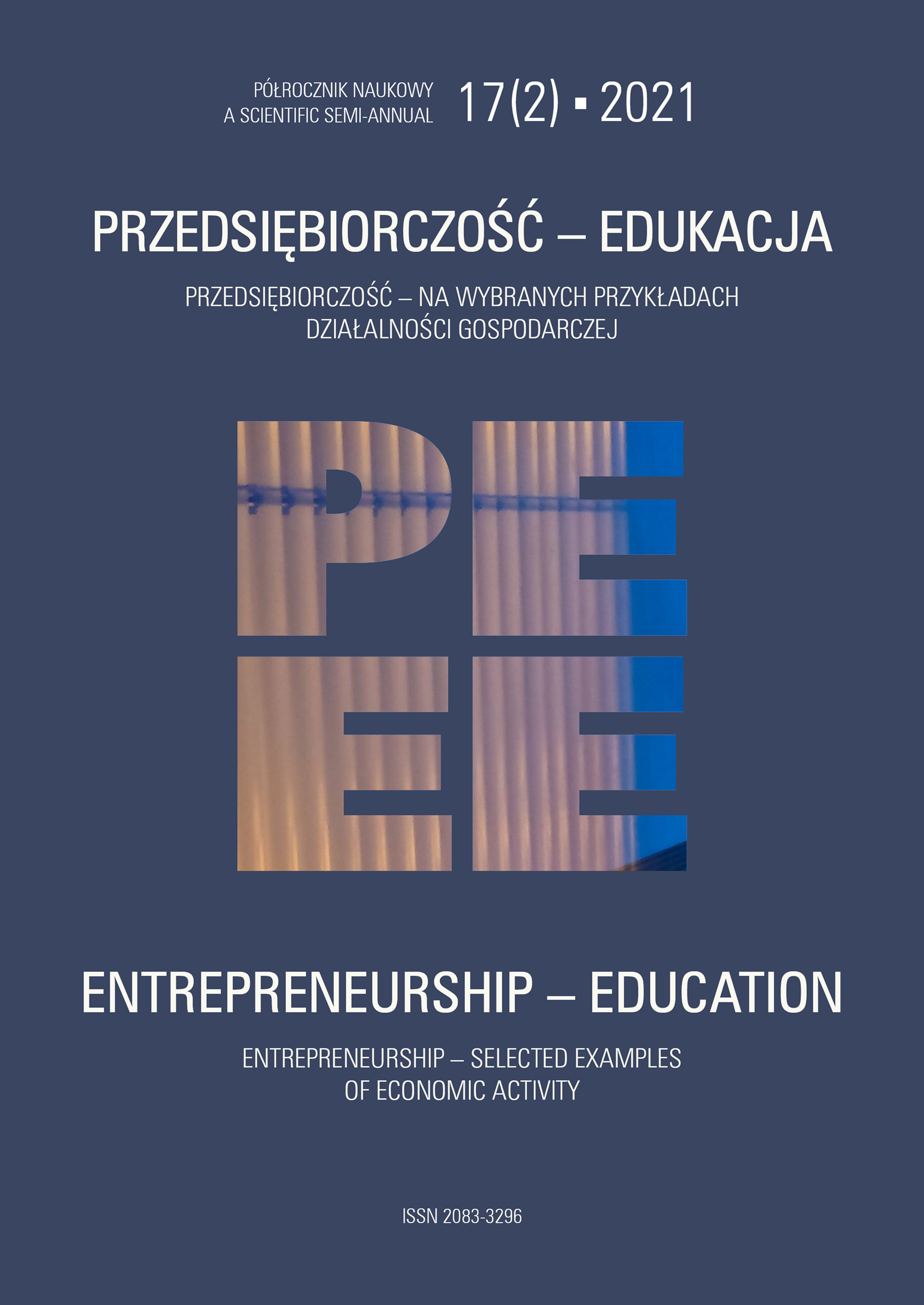Digital transformation of an entrepreneurial university
DOI:
https://doi.org/10.24917/20833296.172.11Keywords:
digital transformation, entrepreneurial university, HEI, technological dimensionAbstract
Digital transformation has radically changed the way all institutions and organisations, including universities, operate in terms of communication and how they function. In the concept of an entrepreneurial university, the dimension of “digital transformation and technological potential” is an important criterion for shaping the entrepreneurial micro-ecosystem. Higher education institutions (HEI) use digital technologies, however the degree of use and integration of technology in institutions, and even units within one institution, varies. Due to the external (epidemic) threat, digital educational platforms made it possible to conduct classes and study in a new, safe and completely remote formula. In the future, the possessed and developed technological potential will influence the formation of a new generation - through a “smart university” and ultimately a “university in the cloud”. The subject of the article is the evaluation of an entrepreneurial university (Cracow University of Economics) in the technological dimension (both digital transformation, technological potential and IT teaching techniques). The evaluation is based on the results of quantitative research carried out using the self-assessment tool (HEInnovate surveys) and qualitative research conducted in 2019 and 2020 in the form of questionnaires with open questions. The results of the research indicate a good assessment of the university’s entrepreneurship and its potential in the analysed dimension.
References
Andrews, D., Nicoletti, G., Timiliotis, Ch. (2018). Digital technology diffusion: A matter of capabilities, incentives or both?. OECD Economics Department Working Papers, 1476.
Barnett, R., Jackson, N. (2019). Ecologies for Learning and Practice: Emerging Ideas, Sightings, and Possibilities, Routledge.
Carayannis, E.G., Barth, T.D., Campbell, D.F. (2012). The Quintuple Helix innovation model: global warming as a challenge and driver for innovation. Journal of Innovation and Entrepreneurship, 1, 2 https://doi.org/10.1186/2192-5372-1-2
Christensen, C.M., Eyring, H.J. (2011). The Innovative University: Changing the DNA of Higher Education, John Wiley & Sons.
Czaja, I., Kafel, T. (2020). Pomiar wdrażania koncepcji przedsiębiorczego uniwersytetu. Przedsiębiorczość – Edukacja [Entrepreneurship – Education], 16(1), 144–158. https://doi.org/10.24917/20833296.161.12
Czaja, I., Kafel, T. (2019). Implementation of the entrepreneurial university concept at the Cracow University of Economics. In: A. Ujwary-Gil, N. Potoczek (eds), Organizations in the Face of Growing Competition in the Market. Warsaw: Institute of Economics, Polish Academy of Sciences, 17–34.
Etzkowitz, H., Leydesdorff, L. (1999). The Future Location of Research and Technology Transfer. The Journal of Technology Transfer, 24(2–3), 111–123.
Gibb, A., Haskins, G., Hannon, P., Robertson, I. (2009). Leading the Entrepreneurial University. Meeting the entrepreneurial development needs of high er education institutions. Retrieved from: https://core.ac.uk/download/pdf/288287534.pdf
Gueye, M., Exposito, E. (2020). University 4.0: The Industry 4.0 paradigm applied to Education. IX Congreso Nacional de Tecnologías en la Educación, Puebla (Mexico), France.
HEInnovate. (2018). The Entrepreneurial and Innovative Higher Education Institution. A Review of the Concept and Its Revelance Today. Retrieved from: https://heinnovate.eu/sites/default/files/heinnovate_concept_note.pdf
Hakak, S., Gilkar, G.A., Guslendra, Ritonga, R., Herawan, T. (2018). Future Private Cloud Architecture for Universities. In: V. Bhateja, B. Nguyen, N. Nguyen, S. Satapathy, Le DN. (eds), Information Systems Design and Intelligent Applications. Advances in Intelligent Systems and Computing, vol 672. Springer, Singapore. https://doi.org/10.1007/978-981-10-7512-4_71
Hytti, U., Blackburn, R., Laveren, E. (2018). Entrepreneurship, Innovation and Education. Frontiers in European Entrepreneurship Research. Elgar Publishing, Cheltenham.
Jørgensen, T. (2019). Digital skills – where universities matter. Learning and Teaching Paper, The European University Association, 7.
Jurva, R., Matinmikko-Blue, M., Niemelä, V. et al. (2020). Architecture and Operational Model for Smart Campus Digital Infrastructure. Wireless Pers Commun, 113, 1437–1454. https://doi.org/10.1007/s11277-020-07221-5
Kusio, T. (2019). Więzi relacyjne uczelni z biznesem. Kraków: Wydawnictwo Akademii GórniczoHutniczej w Krakowie.
Laszewski, T., Nauduri, P. (ed.). (2012). Cloud Computing Deployment Models in Migrating to the Cloud, Syngres. https://doi.org/10.1016/C2010-0-67145-8
Marciniak, K., Owoc, M. (2013). Knowledge management as foundation of smart university. Federated Conference on Computer Science and Information Systems, 1267–1272. Retrieved from: https://ieeexplore.ieee.org/document/6644177
Mathew, S. (2012). Implementation of Cloud Computing in Education – a Revolution. International Journal of Computer Theory and Engineering, 4(3), 473–475.
Meyer-Guckel, V., Klier, J., Kirchherr, J., Winde, M. (2019). Futureskills: Strategische Potenziale für Hochschulen. Discussion Papier No 3, Wydawnictwo Atelier Hauerund Dörfler, Berlin.
Hausner, J. (ed.). (2020). Poza horyzont – kurs na edukację. Przyszłość systemu rozwoju kompetencji w Polsce. Fundacja Gospodarki i Administracji Publicznej. Pozyskano z: https://fundacjagap.pl/program-dialog/#buttons-content
Rachwał, T. (red.). (2019). Kształtowanie kompetencji przedsiębiorczych. Seria Naukowa, t. 5, Warszawa: Wydawnictwo FRSE.
Sharma, P. (2019). Digital Revolution of Education 4.0. International Journal of Engineering and Advanced Technology (IJEAT), 9(2). https://doi.org/10.35940/ijeat.A1293.129219
Sułkowski, Ł. (2014). Który model uniwersytetu? Głosy w dyskusji. Przegląd Socjologiczny, 63(3), 67–70.
Uskov, V.L., Bakken, J.P., Howlett, R.J., Jain, L.C. (2018). Smart Universities. Concepts, Systems, and Technologies. Smart Innovation, Systems and Technologies, 70, 17–21.
Wissema, J.G. (2009). Towards the Third Generation University, Managing the University in Transition. Edward Elgar Publishing.
Zorn, A., Haywood, J., Glachant, J.M. (eds). (2018). Higher Education in the Digital Age: Moving Academia Online. Cheltenham, UK, Northampton, MA, USA: Edward Elgar Publishing Limited.
Downloads
Published
How to Cite
Issue
Section
License
Copyright (c) 2021 Entrepreneurship – Education

This work is licensed under a Creative Commons Attribution-NoDerivatives 4.0 International License.
Articles are published under the terms of the Creative Commons License (CC BY-ND 4.0; Attribution– NoDerivs).

